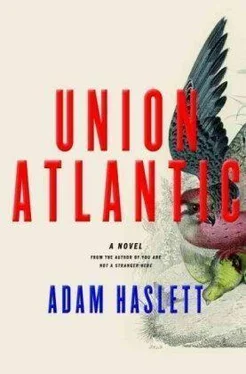“I should mention it to him. No phone calls after nine o’clock.”
“So did you have any warning on this Taconic business?” Henry said.
“None at all. I heard about it today. They must have moved around between lenders. They certainly didn’t come to us.”
Henry found this difficult to believe but chose to let it pass.
“Do you know this fellow Premley?”
“I’ve dealt with him once or twice. They brought him in to fix the place up and sell it. Not such a good bet, apparently.”
“Between us, the Discount Window just extended them thirty of what they owe you.”
“And you think we should roll over the rest?”
“Well, you’ve got an uncovered position yourself. It’s two thirty in the morning.”
He could hear what sounded like ice being put in a glass. Holland swallowed and cleared his throat. He wouldn’t resist now. In the worst case, Union Atlantic would end up writing off the loss for whatever they couldn’t recoup. Alerted to its weakness, Holland might even try to buy Taconic, once its stock price fell into the basement. A flap with the shareholders three months hence measured little against his bank being technically illiquid when the markets opened. They both knew this. Besides, Henry regulated Union Atlantic Group. Holland would offer terms now. The call itself was all that had been necessary.
“It must be an odd job,” Holland said. “To have to keep imagining the real disaster. The whole leveraged shooting match falling to pieces.”
Henry had wandered again onto the balcony, where the breeze had picked up off the water, the waves a bit larger now, boats bobbing against their posts, the fronds of the shaded palms swaying. How could anyone not imagine it these days? After the currency scares, 9/11, the Argentinean default, each of them managed one way or another. The system, in the public eye, still strong, people’s faith in the value of the money in their pocket such a basic fact of life they couldn’t imagine it otherwise. And yet if you’d been on the calls with the Ministers of Finance or with Treasury on the twelfth and the thirteenth — Henry from Basel, his senior staff some of the only people left in lower Manhattan other than the fire and rescue crews — you knew it could have gone differently. One more piece of bad news and the invisible architecture of confidence might have buckled.
About this Holland was right. Henry was paid to worry so the average citizen didn’t have to.
“We do our best,” he said.
“I’ll have my people talk to Premley.”
“I appreciate that,” Henry said. “And of course, the less press about this the better. For everyone’s sake.”
“Naturally.”
“Well, I’ll let you get back to sleep, then.”
“Look after yourself, Henry. The country needs you.” And with that he clicked off the line.
Henry gazed down into the pool lit by wasted power, its surface ruffled by the new motion in the air, which had begun to raise the surf along the beach. Once more he heard the humming of the machine on the roof, the engine of the air conditioner whirring away. He thought of the speech he had to give in a few hours downstairs in the ballroom; the plane ride to LaGuardia; the car ride back up to Rye. And soon enough, the trip he’d have to make to Massachusetts, to sort out this business with his sister, to find somewhere for her to go.
His given family, once and again.
Finden High, a brick pile with arched windows and a squat clock tower, had been erected in 1937 as part of a public works project. Like many such buildings, its bluntness was only partially offset by its few art-deco flourishes, such as the stainless steel that framed the front doors and the zigzag lines carved beneath the modernist clockface. To the grim utility of a factory, its designers had added just a whiff of style. It stood across Wentworth Street from an expanse of playing fields that extended all the way to the river. Not far from the varsity soccer pitch was the spot, commemorated with a plaque and a bench, where the Town Historical Society had decided that the first white families had alighted from their riverboats after traveling the short distance from Boston late in the 1630s. According to records, these settlers had wanted to name the then sparsely populated Algonquin hunting ground “Contentment,” but taking a more practical view the Massachusetts General Court had overridden their decision, imposing upon them instead the solid English name of Finden, considered a better fit with the recently established towns of Roxbury, Gloucester, and the like.
As the students were told each fall in the assembly on local history, which served as a pep talk-cum-guilt trip, one of the settlers’ first acts was the founding of a public school, which the community had maintained throughout its uneventful history of development from a trading post to a farming town to a twentieth-century suburb. Lately, the assembly had featured more on the Native American contributions to local custom but it still concluded with the principal sounding a note of pride about the percentage of seniors going on to four-year colleges, a fact the students were somehow meant to connect through the mists of time to that centuries-old journey down the river by the pious and the brave.
That spring of 2002, however, one particular student, Nate Fuller, was in danger of depressing this statistic. He had failed to fill out his applications to colleges back in the fall and failed again in the spring to apply to those with rolling admissions. His guidance counselor had called him in several times, requesting updates on his progress but he had none to report. Nor did he have a plan of how he might spend a year off to better his chances of getting in the following autumn. His teachers described him as adrift.
Most days this milky-skinned seventeen-year-old could be seen walking the halls dressed in frayed chinos and a blue hoodie, his brown hair grown over his ears and his eyes puffy with sleep. His father had died back in September, and he had been out of school for three weeks. He’d never caught up on the work he’d missed, let alone visited college campuses or written essays on his motivation to learn. Nonetheless, despite his general air of fatigue, he still possessed the changeable quality of the young, his affect shifting quickly from moroseness to affability and back. And though he cared little for his classes, he’d recently promised his mother to meet with the tutor that his American history teacher said he needed if he hoped to pass the AP exam.
On a cloudy day in the middle of April, after his latest dud of an appointment with the guidance counselor, he headed out the back of the school building and through the courtyard onto Pratt Road, where the yards were still wet with the morning’s rain. Friday afternoons were usually the sweetest time of the week, replete with the promise of escape, but today he had the chore of meeting the tutor. He could blow the appointment off if he wanted and simply tell his mother he’d gone. But such deception would require its own energy and the visit would only take an hour.
Between his mother’s new job at the library and his effort to be out of the house in the evenings, he and his mother didn’t see much of each other these days. During the meals they did share, Nate didn’t begrudge his mother her remoteness: how she didn’t seem to hear what he said, how she responded in non sequiturs — bits of news about old friends or relatives, or recollections of trips they had once taken. Time together was tolerable that way. The two of them absent like that.
The difficulty arose when, on occasion, she would come to him with some fact in hand — a grade or health form — something she felt the sudden, fitful need to measure up to as a parent. Then they couldn’t avoid each other, and all her straining in the last year to keep their lives together, to keep them in the house and to pay the bills, would pour into her panicked voice and no matter how small the subject she’d raised it would seem suddenly to be a matter of life and death. That was when he couldn’t bear it and would agree to whatever she asked so they could both turn away again.
Читать дальше












